Bien-être
Structure conceptuelle du bien-être
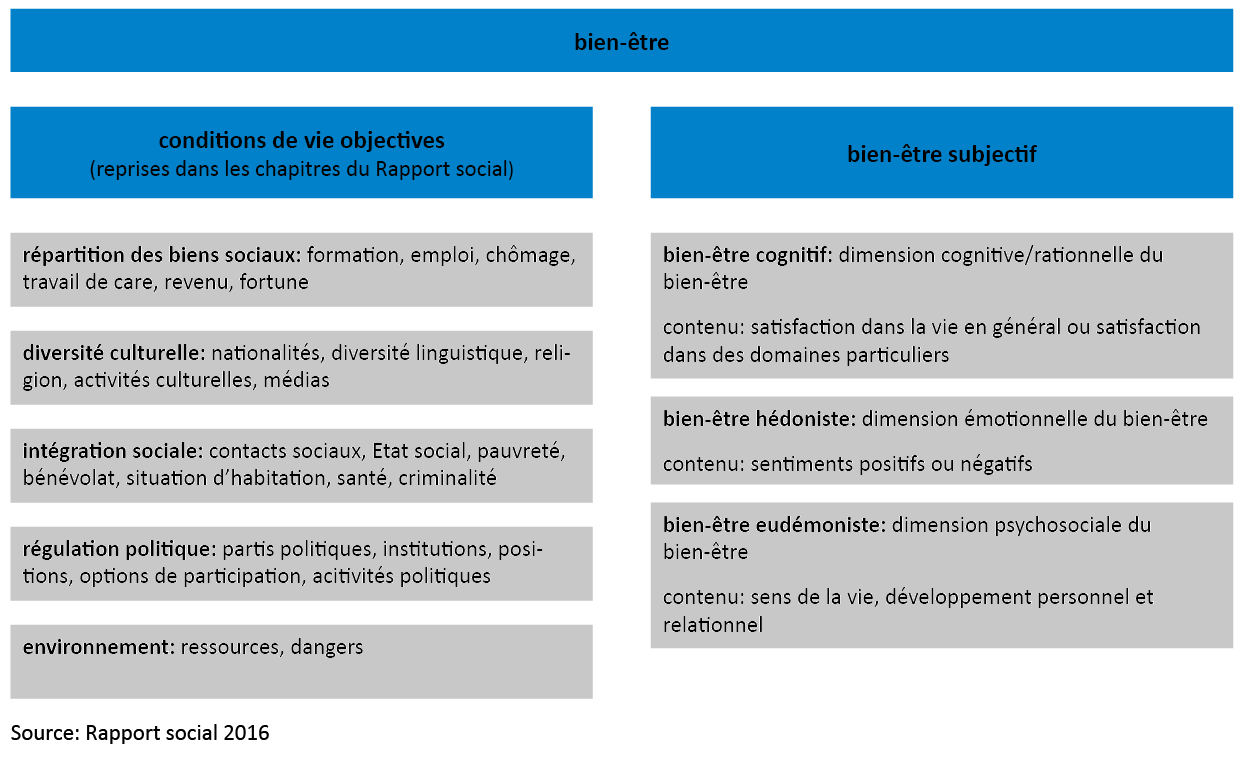
Rapport social suisse 2016
Cet ouvrage contient, en plus d’une sélection de 75 indicateurs, cinq contributions analytiques qui se penchent sur la problématique du bien-être en abordant les thèmes suivants : revenus et contacts sociaux, distanciation à l’égard de la religion, bien-être et pauvreté, participation politique, environnement en tant que facteur de santé.
Publications scientifiques de FORS au sujet de bien-être
The COVID-19 pandemic and wellbeing in Switzerland-worse for young people? Gondek D., Vandecasteele L., Sánchez-Mira N., Steinmetz S., Mehmeti T., Voorpostel M., 2024/06/06. Child and Adolescent Psychiatry and Mental Health, 18 (1). Peer-reviewed. [DOI][WoS][Pmid][serval:BIB_76D61C250C65]
Life Dissatisfaction and the Right-Wing Populist Vote: Evidence from the European Social Survey. Lindholm Annika, Lutz Georg, Green Eva G. T., 2024/03/25. American Behavioral Scientist. [DOI][serval:BIB_50809CE93011]
Dettes et santé mentale : perspective de genre. Henchoz Caroline, Wernli Boris, Coste Tristan, 2024/03/20. SociologieS. Peer-reviewed. [URN][serval:BIB_37EB49FFE4BF]
Going beyond the single item: deriving and evaluating a composite subjective wellbeing measure in the Swiss Household Panel. Gondek Dawid, García Garzón Eduardo, Sánchez-Mira Nuria, Vandecasteele Leen, Steinmetz Stephanie, Voorpostel Marieke, 2024/01/06., FORS. [serval:BIB_78CC39F3BF4B]
Les familles patriciennes : entre persistence et effacement. Legentilhomme Geoffroy, Araujo Pedro, Benz Pierre, Debluë Claire-Lise, Mach André, Strebel Michael A., 2024. pp. 39-56 dans Legentilhomme Geoffroy, Araujo Pedro, Benz Pierre, Debluë Claire-Lise, Mach André, Strebel Michael A. (eds.) Élites et pouvoir dans les grandes villes suisses (1890-2020), Alphil. [URN][serval:BIB_024022465C71]
How loneliness increased among different age groups during COVID-19: a longitudinal analysis. Köster Fiona, Lipps Oliver, 2024/01/01. European Journal of Ageing, 21 (2). Peer-reviewed. [URN][DOI][Pmid][serval:BIB_4DB00CB2E221]
Employment and well-being after plant closure: Survey evidence from Switzerland on the mid and long run. Oesch Daniel, Köster Fiona, Studer Matthias, Baumann Isabel, 2023/12/01. Economic and Industrial Democracy. Peer-reviewed. [URN][DOI][serval:BIB_2A7FE0907890]
Des vies sociales bouleversées ? Les sociabilités en temps de pandémie dans les familles françaises, suédoises et suisses. Landour Julie, Barbier Pascal, Le Goff Jean-Marie, Chatot Myriam, Constantin Sandra, Lidegran Ida, Hultqvist Elizabeth, Braga Kestener Helena, 2023/08/16. Sociologie, 14 (2) pp. 223-240. Peer-reviewed. [serval:BIB_F9A40D8EC67E]
Interdependency of relationships in stepfamilies – Variation across children’s residence arrangements. Arat Ece, Voorpostel Marieke, Bernardi Laura, 2023/06/27. Journal of Social and Personal Relationships, 40 (11) pp. 3656-3678. Peer-reviewed. [serval:BIB_B06ED2E46B00]
A dynamic perspective on the evolution of perceived stress levels in Switzerland: drivers before and during the COVID-19 pandemic. Klaas Hannah S., Kuhn Ursina, Ryser Valérie-Anne, Refle Jan-Erik, Tillmann Robin, Voorpostel Marieke, 2023/04/01. Longitudinal and Life Course Studies, 14 (2) pp. 240-274. Peer-reviewed. [URN][DOI][serval:BIB_0F0468CBDCDE]
How much his or her job loss influences fertility: A couple approach. Di Nallo Alessandro, Lipps Oliver, 2023/02/13. Journal of Marriage and Family. Peer-reviewed. [URN][DOI][WoS][serval:BIB_A3BAB2B3B263]
Egalité des sexes et bien-être: Se marier ou vivre en union libre dans le contexte Suisse ? Le Goff Jean-Marie, Ryser Valérie-Anne, 2023/02/08. pp. 47-74 dans Diversité des familles et bien-être en SuisseEnquête sur les familles et les générations 2013 et 2018, Seismo. URN][serval:BIB_2F0C9CEF1215]
Is the unhappy citizen a populist citizen? Linking subjective well-being to populist and nativist attitudes. Lindholm Annika, Rapeli Lauri, 2023/01/12. European Political Science Review 15 pp. 465-481. Peer-reviewed. [URN][DOI][serval:BIB_2F949513E7F8]
Subjective Well-Being, Family Dynamics and Vulnerability. Le Goff Jean-Marie, Ryser Valérie-Anne, Bernardi Laura, 2023. pp. 17-29 dans Withstanding Vulnerability throughout Adult Life, Springer Nature Singapore. [URN][DOI][serval:BIB_90954EC8E874]
How Family and Other Close Ties Shape Vulnerability Processes. Rossier Clémentine, Bernardi Laura, Baersywil Marie, Oris Michel, Sapin Marlène, Widmer Eric, 2023. pp. 153-167 dans Withstanding Vulnerability throughout Adult Life, Springer Nature Singapore. [DOI][serval:BIB_D62F8502DFB5]
How Personal Relationships Affect Employment Outcomes: On the Role of Social Networks and Family Obligations. Lalive Rafael, Oesch Daniel, Pellizzari Michele, 2023. pp. 49-66 dans Withstanding Vulnerability throughout Adult Life, Springer Nature Singapore.[URN][DOI][serval:BIB_42A7A01D2F20]
Pour toutes les publications scientifiques des collaboratrices et collaborateurs de FORS, voir ici.
Going beyond the single item: deriving and evaluating a composite subjective wellbeing measure in the Swiss Household Panel
Dawid Gondek, Eduardo García Garzón, Núria Sánchez-Mira, Leen Vandecasteele, Stephanie Steinmetz, Marieke Voorpostel
2023-2
Political interest in Swiss probability-based political and social surveys
Nursel Alkoç
2023-1
Family Diversity: Updating a Household Typology in the Swiss Household Panel
Sandrine Morel
2021-3
Entropy measures of social mobility: The example of the intergenerational transmission of education
Georg P. Mueller
2021-2
Measurement of Sexism, Gender Identity, and Perceived Gender Discrimination: A Brief Overview and Suggestions for Short Scales
Jérôme Blondé, Lavinia Gianettoni, Dinah Gross and Edith Guilley
2021-1
Negative Voting Revisited: The 2020 US Presidential Election
Diego Garzia and Frederico Ferreira da Silva
2020-3
Sequentially mixing modes in an election survey
Oliver Lipps and Nicolas Pekari
Lipps, O. & Pekari, N. (2021). Sequentially mixing modes in an election survey. Survey Methods:
Insights from the Field. Retrieved from https://surveyinsights.org/?p=15281
DOI:10.13094/SMIF-2021-00003
2020-2
Introducing web in a refreshment sample of the Swiss Household Panel: Main findings from a pilot study
Marieke Voorpostel, Ursina Kuhn, Robin Tillmann, Gian-Andrea Monsch, Erika Antal, Valérie-Anne Ryser, Florence Lebert, Hannah S. Klaas and Nora Dasoki
2020-1
First results of the Swiss Household Panel – Covid-19 Study
Jan-Erik Refle, Marieke Voorpostel, Florence Lebert, Ursina Kuhn, Hannah S. Klaas, Valérie-Anne Ryser, Nora Dasoki, Gian-Andrea Monsch, Erika Antal and Robin Tillmann
2019-2
Effects of topic distribution and topic importance on interest and follow-up response
Oliver Lipps and Alexandre Pollien
2019-1
Item nonresponse and fuzzy logic
Georg P. Müller
2018-1
A research note on the potential impact of panel attrition on the relationship between variables
Marieke Voorpostel, Martina Rothenbühler, Caroline Roberts and Caroline Vandenplas
2017-2
Material deprivation from 1999 to 2013 in Switzerland: How index construction impacts on measured patterns of evolution
Pascale Gazareth and Katia Iglesias
2017-1
The impact of assortative mating on income inequality in Switzerland
Ursina Kuhn and Laura Ravazzini
2016-3
A methodological journey towards integrating a gender perspective into the measurement of violence against women and intimate partner violence
Julien Chevillard, Lavinia Gianettoni, and Véronique Jaquier
2016-2
Who are my people? Strengths and limitations of ego-centered network analysis: A case illustration from the Family tiMes survey
Gaëlle Aeby
2016-1
Does it take a village to raise a child? The buffering effect of relationships with relatives for parental life satisfaction
Małgorzata Mikucka and Ester Rizzi
A different version of this paper has meanwhile been published as :
Małgorzata, M. & Rizzi, E. (2016). Does it take a village to raise a child? The buffering effect of relationships with relatives for parental life satisfaction. Demographic Research 34, 943-994.
2015-5
Psychometric properties of extra-short Big Five personality measures in multi-topic surveys: Documenting personality traits in the SHP and MOSAiCH
Valérie-Anne Ryser
2015-4
An evaluation of the CASP-12 scale used in the Survey of Health, Ageing and Retirement in Europe (SHARE) to measure Quality of Life among people aged 50+
Carmen Borrat-Besson, Valérie-Anne Ryser and Judite Gonçalves
2015-3
The happiness-parenthood link in a context of limited state support: The case of Switzerland
Ester Rizzi and Malgorzata Mikucka
2015-2
Big data for the social sciences
Brian Kleiner, Alexandra Stam and Nicolas Pekari
2015-1
Non-observation bias in an address-register-based CATI/CAPI mixed mode survey
Oliver Lipps
A different version of this paper has meanwhile been published as :
Lipps, O. (2016). Non-observation bias in an address-register-based CATI/CAPI mixed mode survey.
Methods, Data, Analyses 10(1): 5-24. DOI: 10.12758/mda.2016.001.
2014-3
Robustness of items within and across surveys
Caroline Vandenplas and Oliver Lipps
2014-2
A Versatile tool? Applying the Cross-national Error Source Typology (CNEST) to triangulated pre-test data
Rory Fitzgerald, Lizzy Winstone and Yvette Prestage
2014-1
Learning, understanding, and motivation effects on “don’t know” in panel surveys
Oliver Lipps
2013-6
Boundaries against immigrants and their subjectively felt discrimination
Kerstin Duemmler
2013-05
A foreigner who doesn’t steal my job : The role of unemployment risk and values in attitudes towards foreigners
Marco Pecoraro and Didier Ruedin
A different version of this paper has meanwhile been published as :
Pecoraro, M., & Ruedin, D. (2015). A foreigner who does not steal my job: The role of unemployment risk and values in attitudes toward equal opportunities. International Migration Review, 50(3), 628-666.
2013-04
The Swiss Rolling Cross-Section Study : Design, field work, and data quality
Georg Lutz, Thomas de Rocchi and Nicolas Pekari
2013-03
Mode and incentive effects in an individual register frame based Swiss election study
Oliver Lipps and Nicolas Pekari
A different version of this paper has meanwhile been published as :
Lipps, O., & Pekari, N. (2016). Sample Representation and Substantive Outcomes Using Web With and Without Incentives Compared to Telephone in an Election Survey. Journal of Official Statistics, 32(1), 165-186.
2013-02
Coverage and nonresponse errors in an individual register frame based Swiss telephone election study
Oliver Lipps, Nicolas Pekari and Caroline Roberts
A different version of this paper has meanwhile been published as :
Lipps, O., Pekari, N., & Roberts, C. (2015). Undercoverage and Nonresponse in a List-sampled Telephone Election Survey. Survey Research Methods, 9(2), 71-82.
2013-01
Using the Swiss population register for research into survey methodology
Caroline Roberts, Oliver Lipps and Kathrin Kissau
2012-03
Travail atypique et accès au troisième pilier en Suisse
Jenny Assi
2012-02
Parcours de formation : Analyse des trajectoires de formation des personnes résident en Suisse
Alexandre Pollien and Lorenzo Bonoli
2012-01
Satisficing and language proficiency
Brian Kleiner, Oliver Lipps and Eliane Ferrez
A different version of this paper has meanwhile been published as :
Kleiner, B., Lipps, O., & Ferrez, E. (2015). Language Ability and Motivation Among Foreigners in Survey Responding. Journal of Survey Statistics and Methodology, 3(3), 339-360.
2011-04
Advance translation in the 5th round of the European Social Survey (ESS)
Brita Dorer
2011-03
National minorities and their representation in Swiss surveys (II) : Which practices make a difference ?
Francesco Laganà, Guy Elcheroth, Sandra Penic, Brian Kleiner, and Nicole Fasel
A different version of this paper has meanwhile been published as :
Laganà, F., Elcheroth, G., Penic, S., Kleiner, B., & Fasel, N. (2013). National minorities and their representation in social surveys : which practices make a difference ? Quality & Quantity, 47(3), 1287-1314.
2011-02
National minorities and their representation in Swiss surveys (I) : Providing evidence and analysing causes for their under-representation
Oliver Lipps, Francesco Laganà, Alexandre Pollien, and Lavinia Gianettoni
A different version of this paper has meanwhile been published as :
Lipps, O., Laganà, F., Pollien, A., & Gianettoni, L. (2013). Under-representation of foreign minorities in cross-sectional and longitudinal surveys in Switzerland. In Joan Font & Mónica Méndez (eds.) : Surveying Ethnic Minorities and Immigrant Populations : Methodological Challenges and Research Strategies : Amsterdam University Press : 241-267.
2011-01
Predictability of reasons for refusal in telephone surveys
Oliver Lipps
A different version of this paper has meanwhile been published as :
Lipps, O. (2012). Using information from telephone panel surveys to predict reasons for refusal. Methoden – Daten – Analysen 6 (1) : 3-20.
2010-04
The determinants of fixed-term contracts in contemporary Switzerland
Spartaco Greppi, Mario Lucchini, Jenny Assi, and Christian Marazzi
2010-03
Dialect-driven adaptation : Experiences from Switzerland
Isabelle Renschler, Brian Kleiner, and Martina Bichsel
A different version of this paper has meanwhile been published as :
Renschler, I., & Kleiner, B. (2013). Considering Dialect in Survey Research. Bulletin of Sociological Methodology/Bulletin de Méthodologie Sociologique, 118(1), 51-59.
2010-02
Contact time optimization in panel surveys
Oliver Lipps
A different version of this paper has been published as :
Lipps, O. (2012). A Note on improving Contact Times in Panel Surveys. Field Methods 24 (1) : 95-111.
2010-01
Income imputation in the Swiss Household Panel 1999-2007
Oliver Lipps
2009-02
The electoral success of beauties and beasts
Georg Lutz
A different version of this paper has meanwhile been published as :
Lutz, G. (2010). The Electoral Success of Beauties and Beasts. Swiss Political Science Review, 16(3), 457-480.
2009-01
Innovations and new technologies in panel research
Annette Scherpenzeel
This working paper combines parts of three other publications by the same author :
Scherpenzeel, A. & Das, J.W.M. (2010). ’True’ longitudinal and probability-based internet panels : Evidence from the Netherlands. In : Das, J.W.M. ; Ester, P. ; Kaczmirek, L. (Ed.) Social and Behavioral Research and the Internet : Advances in Applied Methods and Research Strategies.
Scherpenzeel, A. & Bethlehem, J. (2010). How representative are online-panels ? Problems of coverage and selection and possible solutions. In Social Research and the Internet : Advances in applied Methods and New Research Strategies. Eds. M.Das, P.Ester & L.Kaczmirek. New York : Routlegde Academic.
Scherpenzeel, A., & Toepoel, V. (2012). Recruiting a Probability Sample for an Online Panel : Effects of Contact Mode, Incentives, and Information. Public Opinion Quarterly, 76(3), 470-490.

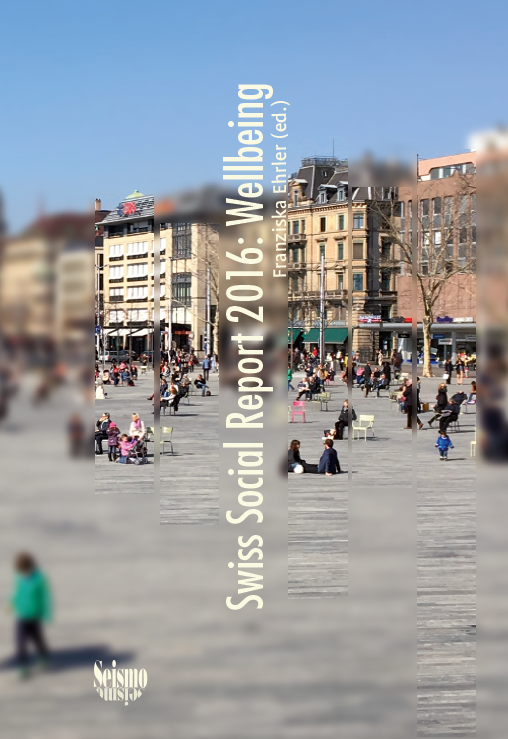

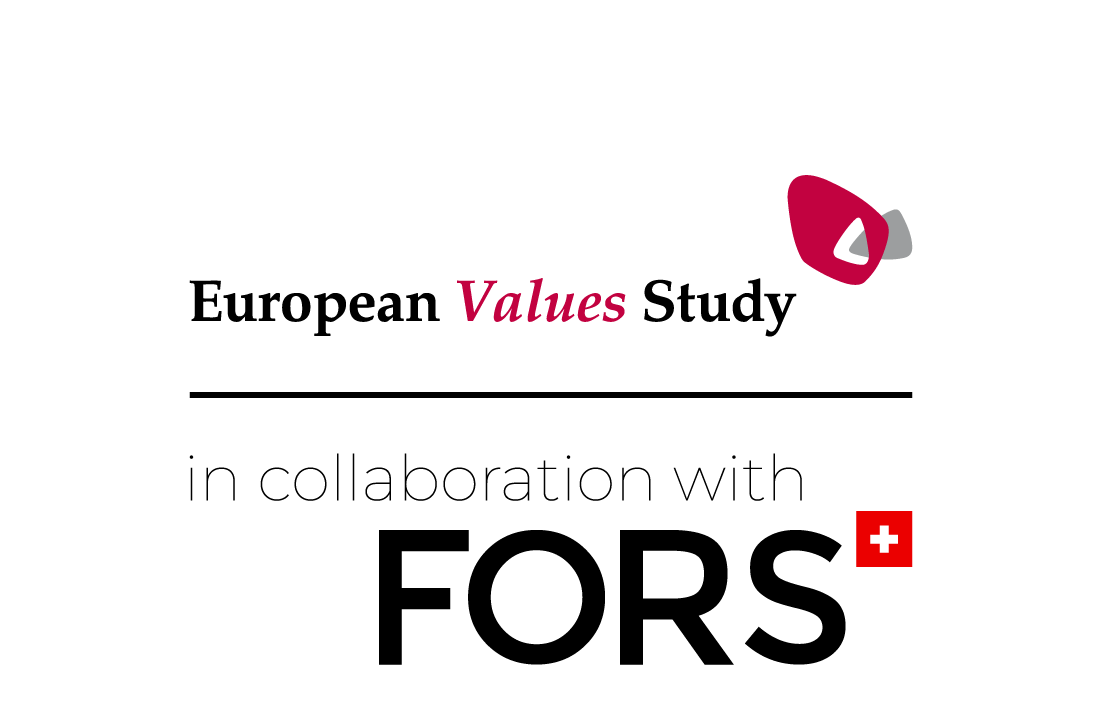

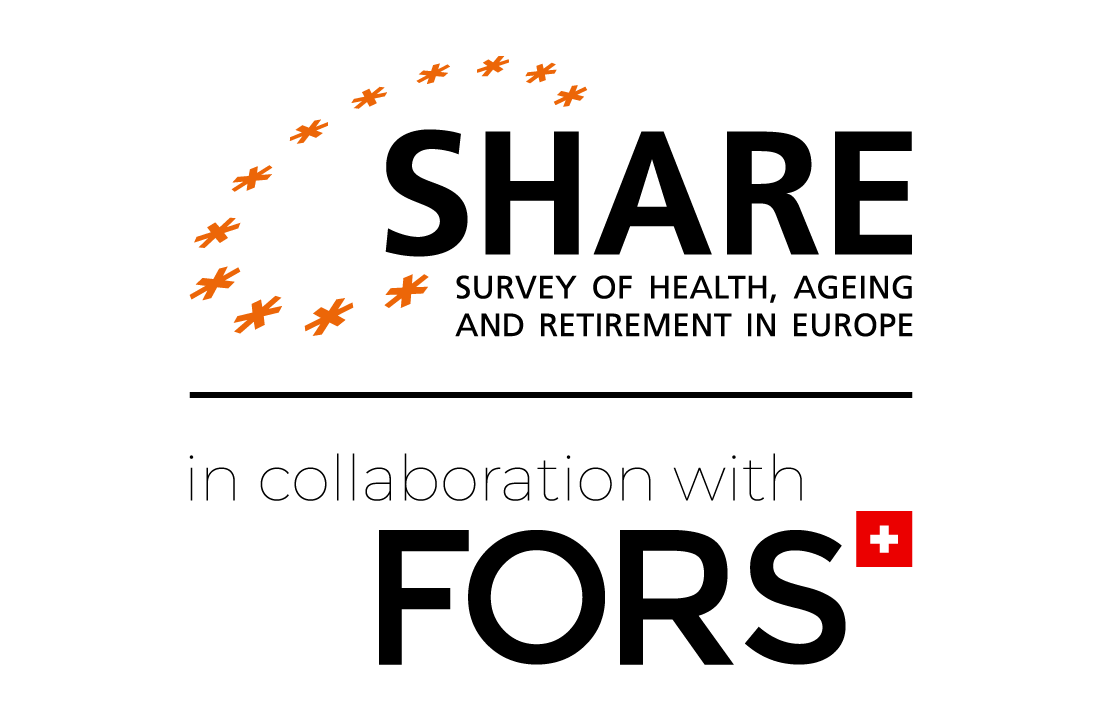
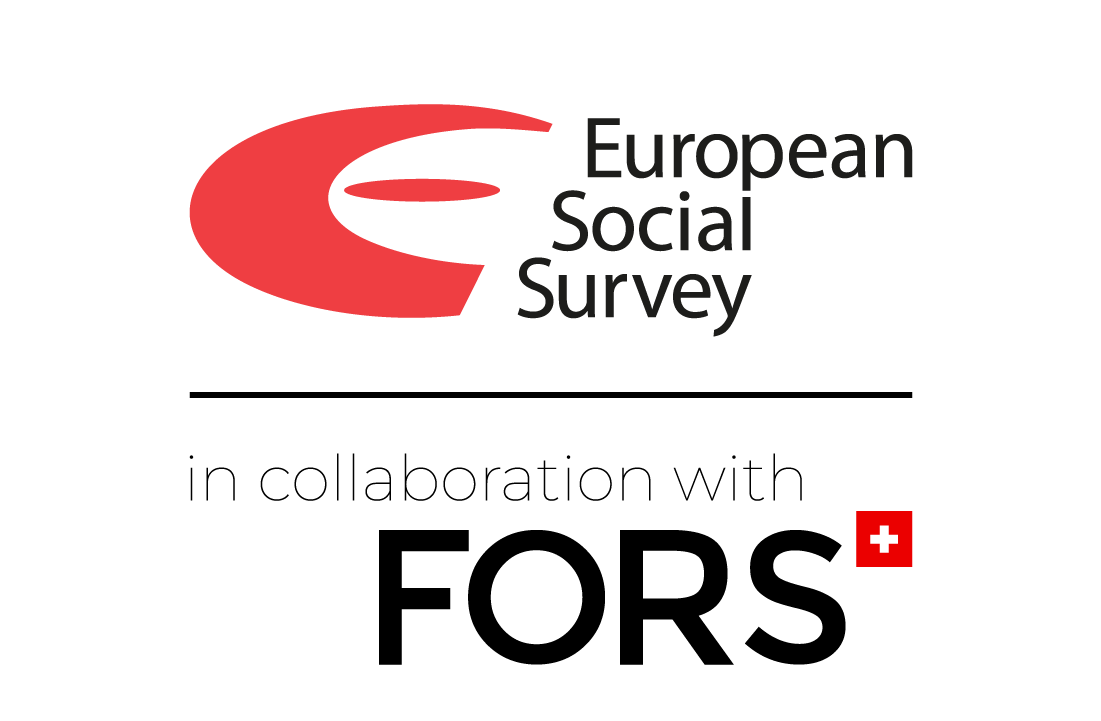

 Bâtiment Géopolis,
Bâtiment Géopolis, +41 (0)21 692 37 30
+41 (0)21 692 37 30

